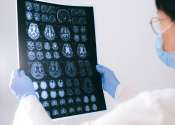Could bizarre visual symptoms be a telltale sign of Alzheimer's?
A team of international researchers, led by UC San Francisco, has completed the first large-scale study of posterior cortical atrophy, a baffling constellation of visuospatial symptoms that present as the first symptoms of ...
Jan 22, 2024
0
43









